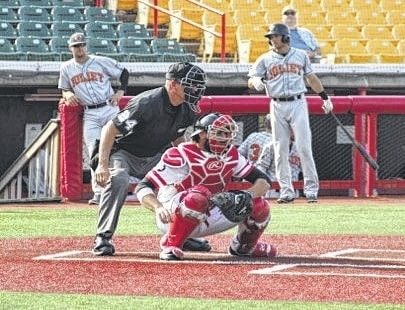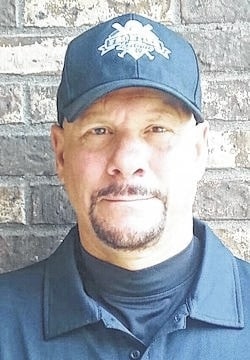

ANNA — Mike Martin, of Anna, has been umpiring college and professional baseball games for more than a quarter of a century.
But he never set out to be the guy behind home plate yelling, “Steeeeeee-rrrike!” Never planned to be the guy the crowd routinely boos.
Martin went to umpire school because he thought it would make him a better coach.
The Elida High School graduate had played football and baseball for Ohio Norhern University, where he earned a Bachelor of Arts in education. He taught science, math and Bible studies in a junior high school, and he was the head soccer coach. He also coached junior varsity baseball. When he became the head baseball coach, he realized that coaches and umpires don’t see the game the same way.
“How to be a better coach?” he asked himself. “I need to understand what it means to umpire,” he answered. “(Learning to be an umpire) might be the best thing I ever did.”
He took classes, attended meetings, passed a test and became certified by the Ohio High School Athletic Association.
He started by working games at the junior high level and over the years, graduated to junior varsity, high school, college divisions III, II and I and then minor league games.
Now, he oversees NCAA Division I contests. He umped the Ohio State/Michigan game this year.
“At the high school level, I worked 11 state tournaments. The first was in 1991 and the last, in 2003,” Martin said. At the same time, he began to cover college games. These days, he works from March to May in college ballparks and from June to October on the diamonds of the independent minor Frontier League.
“Mike has worked in the league for many years. He is a consummate professional that strives to be the best he can be every night,” said Frontier League Commissioner Bill Lee.
Umpires are independent contractors. At the high school and college levels below Division I, they get their jobs through assigners.
“The assigners have maybe 50 schools,” Martin said. “They make assignments.” Some assigners are also umpires. They see what their peers are doing and if they like what they see, they sometimes invite those peers to join their stable of assignees. That’s how Martin worked his way up the umpiring ladder. He’s been doing college games for 25 years, 15 of those for Division I. In addition to the OSU/Michigan game, this year he was an umpire for Penn State/Maryland and for Purdue/Michigan State.
“Every week, I’m somewhere,” he said. Until he recently retired from the Honda Anna Engine Plant to open a florist/gift shop in Anna with his wife, Betsy, he used all of his vacation and personal time off to work games.
“By October, I’ll know my schedule for next spring,” he said. This year, he handled 57 college games and by season’s end, he will have done 60 professional contests. He has umped in nine conference tournaments, including one in the Big 10. He also has worked the Frontier Cup playoffs more than once. Eventually, he’d like to umpire a college world series in Omaha.
Each game requires three umpires. One of them is selected by the assigners to serve as crew chief, a role Martin has taken many times. The crew chief oversees the other two umpires, making sure they have travel and hotel arrangements in place and guests listed for seats at the games. Sometimes, Martin enlists Betsy’s help for that part of the job.
On the field, for the first game of the series, the crew chief works at home base. For subsequent games, the three rotate positions among home, first and third bases. The umps arrive an hour and a half before the game starts. In the minor leagues, they use some of that time to rub five dozen baseballs with a compound known as mud. It’s the responsibility of the umpires to get the balls ready for the game.
Martin’s had his share of arguments with players and coaches.
“They’ll pop off every once in awhile,” he noted. “What separates the good from the great umpires is handling a fit. If you can handle a fit, you can make things go away and you don’t have to eject people.”
One way to do that is to admit your own mistakes, he said. During a recent game, Martin called a pitch a strike.
“It was obviously a ball. My timing was horrible,” he said. Umpires have to make a call based on split-second recognition of a ball’s trajectory from pitcher to batter. Every once in awhile, Martin’s timing is too fast.
“The batter was the ultimate professional. He knew, but he just walked away,” Martin said. The third base coach, however, called him on it later.
“Mike, where did you have that pitch?” the coach asked.
“It was outside the strike zone,” Martin admitted.
“You mean, you didn’t have that a strike?” rejoined the coach.
“My timing was horrible. That was a bad call,” said Martin. The coach was speechless.
“I never had an umpire be so honest,” he said. “I didn’t know what to say.”
Martin’s fellow umpires aren’t speechless at all when it comes to talking about what makes the Anna resident one of the best.
“He has a very calm demeanor,” said Deron Brown, of Troy, the Frontier League’s director of umpires. “No matter how excited people around him are, he’s calm under fire. He has a way about him to diffuse things. I wish I had more of that. I wouldn’t get in trouble so much,” Brown laughed.
Martin noted that if a player walks away from a call, even a bad one, Martin will let him go. But if the player questions a call, Martin will say the he, the umpire, has made the right judgment.
“When it goes from (talking about) the pitch to when it gets personal, when he says, ‘You …,’ that’s going to end in ejection,” Martin said. “That’s not something we look to do, but sometimes you have to to take care of business.”
Sometimes, a coach asks to be ejected!
“A coach will come out to the mound, pretending to be angry about a call. He’ll say, ‘We’re playing terrible. I can’t stand to watch. Eject me.’ It’s the game within the game,” Martin laughed. The coach thinks that his team will rally if their leader is thrown out. Does that really work to inspire a team?
“No,” Martin said.
He perfects his craft by listening to the umpires he works with and by watching his peers on television during major league games.
“I’m always watching their mechanics and mannerisms. They’re the best of the best, but they make mistakes. Whether it’s a pitch or a call on the bases, it comes down to timing,” he said.
Players enjoy it when an umpire falls or gets knocked down. They think it’s funny. Martin has been hit with countless foul balls and sometimes with bats that players toss before taking off for first base.
“I’ve never broken anything. You’ll get a baseball to the mask that will knock you silly for a couple minutes. The inside of your thighs will get hit; your legs will take a beating because there’s no protection there,” he said.
But he’ll put up with all of that, to be out there on the diamond.
“I just love the game of baseball,” Martin said. “I can’t believe they pay me for this. I can have so much fun and then they’re going to give me a check!”



